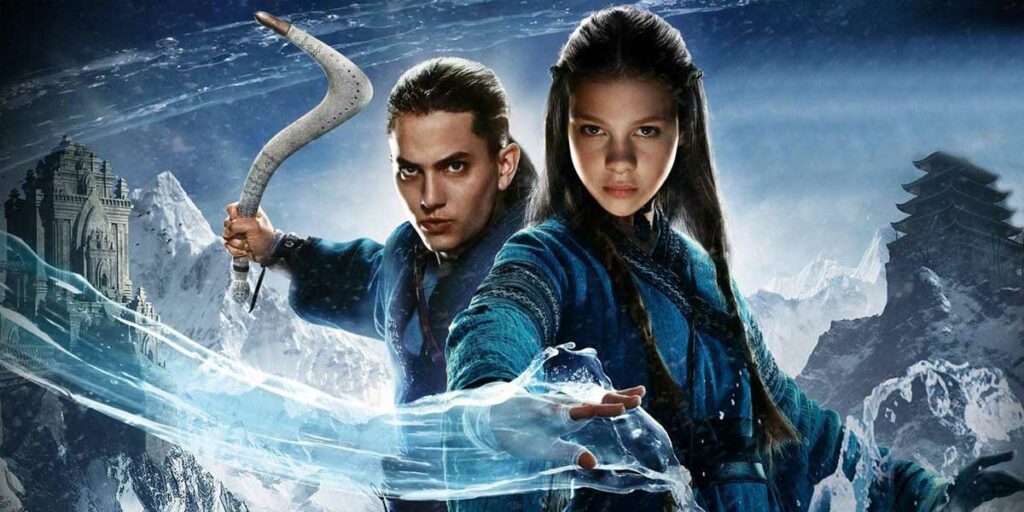M. Night Shyamalan’s The Last Airbender has been derided as one of the worst films of all time. But while it’s certainly bad, here’s why it’s not terrible.
I know what a lot of you are probably thinking: Why would anyone be reviewing M. Night Shyamalan’s The Last Airbender right now? It’s been over a decade since it came out, everyone has expressed why it’s so terrible ad nauseum, Shyamalan’s moved well past it by now … everything about the film and its legacy has run its course. What more can there possibly be to say about one of the most hated films of all time?
Well, how about this … I don’t hate it.
Believe me, for this movie, that could qualify as a “hot take.” The Last Airbender is a live-action adaptation of the first season of the beloved animated series Avatar: The Last Airbender. The story begins when siblings Katara (Nicola Peltz Beckham) and Sokka (Jackson Rathbone), who live in the Southern Water Tribe, accidentally release a boy named Aang (Noah Ringer) from an iceberg. Aang turns out to be the Avatar, the only one who can “bend” all four elements of air, water, earth, and fire, and who disappeared over 100 years ago. Aang, Katara, and Sokka head for the North Pole to find a waterbending teacher for Aang, who’s only mastered air, while being pursued by Prince Zuko (Dev Patel) and Commander Zhao (Aasif Mandvi) of the Fire Nation, which has waged war on the world and is threatened by the Avatar’s return.
I grew up with the original Avatar: The Last Airbender, having followed and loved it from its premiere to its finale. I’ll go as far as to say it’s the best show I ever watched in my childhood, and it still holds up excellently today. When the film adaptation came out, however, I was in my teens and wanting to “outgrow” animation, so I saw the movie and was pleasantly surprised that it was less, for lack of a better word, cartoonish than the show. It was only in the weeks afterward that I actually thought about its quality and realized that it’s bad as a film. But even then, I didn’t feel “burned” by the movie. I never felt the hatred or sense of betrayal that other fans felt, since we still had the show and my initial viewing was somewhat pleasant.
Which I think is partially why, when I rewatched The Last Airbender so many years later, with so much more experience and having seen Shyamalan’s other films (this was the first I’d ever seen from him), I found myself enjoying it as a guilty pleasure. Make no mistake: The Last Airbender is a bad movie. Its monumental issues are all painfully clear, and I’m not going to defend it as good by any stretch of the imagination. But it’s not terrible, and I am going to defend a handful of its intended ideas and even a few areas where it nails the execution … while still acknowledging that the film fails at a majority of what it tries to do.
TERRIBLE PACING THROUGH A SOLID STRUCTURE
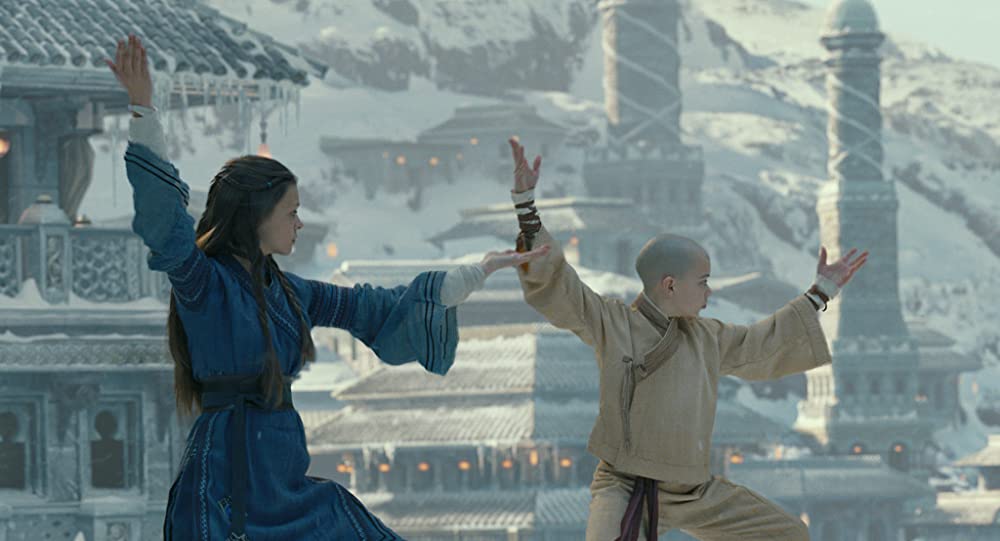
The clear-cut biggest problem with The Last Airbender is the story flow. Almost every major event of the movie comes and goes with absolutely zero fanfare, and almost never can we take a single breath to let characters have proper reactions to what’s going on. To a point where many shots and even entire sequences feel like they’re missing. I’m not just saying that as someone who knows the show and notices what was cut out. Even a newcomer would notice how rushed the story is, how many details are just glossed over, and how frequently the constant expository dialogue overshadows any emotion that a scene is supposed to have.
I don’t necessarily blame Shyamalan for relying so heavily on exposition, but the way he crams so much information in with, again, no room to breathe at all, undoes all of the intrigue in what characters are doing and saying. Which is a shame, because I can see how most of it could work if more time was allowed. The Last Airbender clocks in at just over an hour and forty minutes, but for a story this densely layered to work, it needed to be over two hours at the very least. Maybe even close to three hours to make The Last Airbender an epic of the same scope as a Lord of the Rings movie.
Had The Last Airbender been given that extra time, the transitions between sequences and even lines of dialogue could have been a lot smoother and fed much more naturally into one another. I say this because, much to my surprise upon rewatch, the film’s plot structure is actually really smart. Taking a whole season of television that contains a mix of overarching stories and one-off adventures, and turning that into a single, condensed film, is an immense challenge. You have to know what needs to stay in, what can be dropped, and how to incorporate as many of the best moments as possible into a flowing narrative.
When I look at the outline of The Last Airbender’s plot and even the structure of certain scenes, I think it succeeds on that front in concept. It combines a lot of different storylines from the show’s first season and weaves them together in a way that makes a lot of sense, even helping the arcs and development of certain characters feel more streamlined and cinematic. There’s a sequence where Aang and his friends help liberate a tribe of imprisoned earthbenders. In the show, this is its own little adventure, which works in that episodic format. Here, though, it’s the inciting incident that gets Aang to help others and reveal his true identity to the world. That’s a great idea, and there are many others like that. The flow and dialogue that gets us through all of these beats are what cause everything to collapse, but the foundation really is solid.
THE VISUAL STRENGTHS AND WEAKNESSES OF THE LAST AIRBENDER
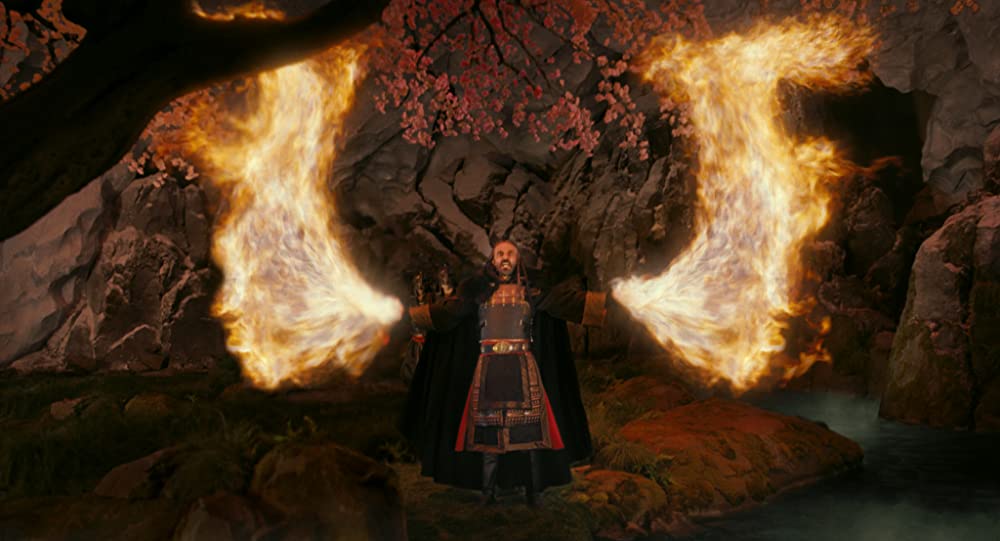
While The Last Airbender couldn’t make the shift from television to film work script-wise, though, it absolutely makes it work visually … for the most part. One of the very few aspects of the film that I will defend as legitimately great is the production design, along with some of the cinematography. The show features some of the most breathtaking environments you could find in a fantasy story, and The Last Airbender keeps all of that intact. The Southern Water Tribe really looks and feels like a huge, arctic wasteland. The air temples look like real, authentic monk temples. The more advanced Northern Water Tribe looks gorgeous, and the sheer scale of it is fully captured, which should be appreciated by those who know the show and garner the awe and wonder of those who don’t.
If you were to ask me what a live-action version of Avatar: The Last Airbender’s settings could and should look like, this movie would be pretty spot-on. It’s not as exaggerated as its animated counterpart, but it blends the realism of live-action with the mythical beauty of its source material to create an environment that’s grounded but still fun and colorful. Even the costume design works for similar reasons. I feel this way especially now, in an age where so many big blockbusters rely solely on greenscreen backgrounds that never make me feel like I’m in their worlds. I felt like I was in the world of The Last Airbender.
Unfortunately, I can’t say the same for the action, which is really clunky and unconvincing. Though again, I see what it’s going for: a more grounded sense of weight and choreography that feels practical while still being heightened and dynamic. But the movements of the actors and stunt doubles just can’t keep up with that, making a lot of shots look like trial runs. Shyamalan also uses a lot of long takes during some fights. I don’t dislike this idea at all, but he clearly wasn’t able to get everything looking how it needed to as a result. The fight in the earthbender prison is especially weak, with laughable uses of bending and a lot of actors looking like they’re waiting for the camera to reach them before they do something.
I love most of the angles and framing used in these sequences, and I’m not against slowing the action down a little to get a sense of realism. There’s a POV shot of Aang flying over a battle, which I would adore seeing done right. But it needed to be faster, like most of the action. The Last Airbender bites off way more than it can chew, but I appreciate the attempts. Combine these problems with some of Shyamalan’s notoriously overused close-up shots and an excessive use of slow-motion, and you have a film that’s rough around the edges to look at even with how much it does right. The CGI’s also imperfect, but it’s okay for the most part. I at least think it holds up better than the CGI in a handful of films that released after 2010. (And I don’t know how the panned 3-D conversion looked, because I like my eyes and watch most movies in 2-D.)
CASTING: THE GOOD, THE BAD, AND THE PROBLEMATIC
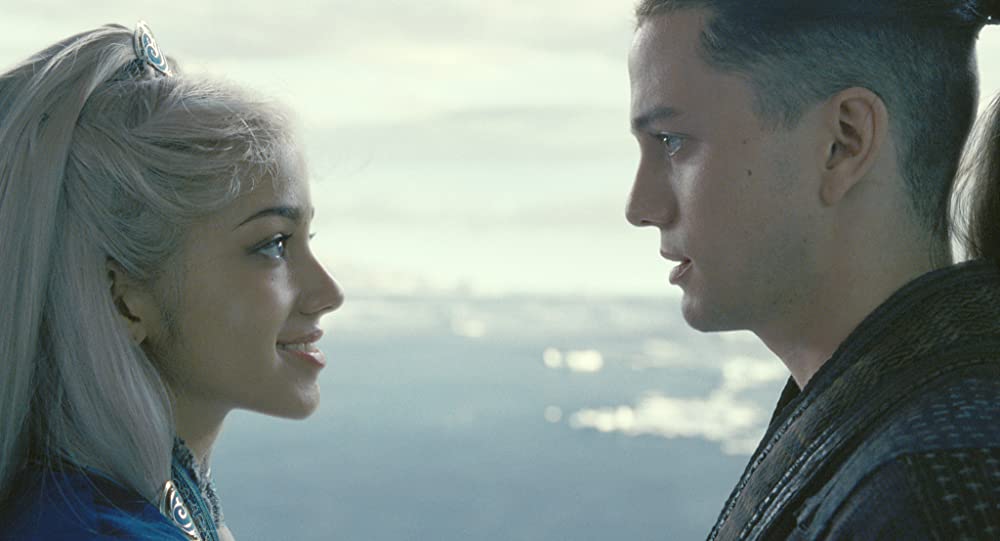
Those close-ups also allow you to easily see how awkward most of the film’s performances are. I feel bad for the child actors who play Aang, Katara, and Sokka, but they look so lost a lot of the time. They’re not godawful, just really unconvincing. The villains fare much better, as Dev Patel, Shaun Toub (who plays Zuko’s kindhearted uncle), and Aasif Mandvi all do a good, if not amazing, job. They’re the only actors who bring actual weight to their roles, and they even have some subtleties that make you want to read into what they’ve been through.
But hey, look, there’s a giant elephant in the room, and he wants me to talk about the casting controversy! For those who don’t know, Katara and Sokka had an Inuit look in the show, but they’re both white in The Last Airbender, while the lighter-skinned villains like Zuko and Zhao now have darker complexions. Which … yeah, I’ve got no excuse for that. It’s not like this isn’t an ethnically diverse cast, but the specific choices of what races were changed to what were clearly poorly thought out. That’s not a matter of authenticity to a show, that’s just basic common sense. Obviously Shyamalan himself is Indian, so I think it’s a bit much to call him a racist … but someone somewhere clearly needed to step in and point out what’s wrong with this picture.
THE LAST AIRBENDER AS AN ADAPTATION
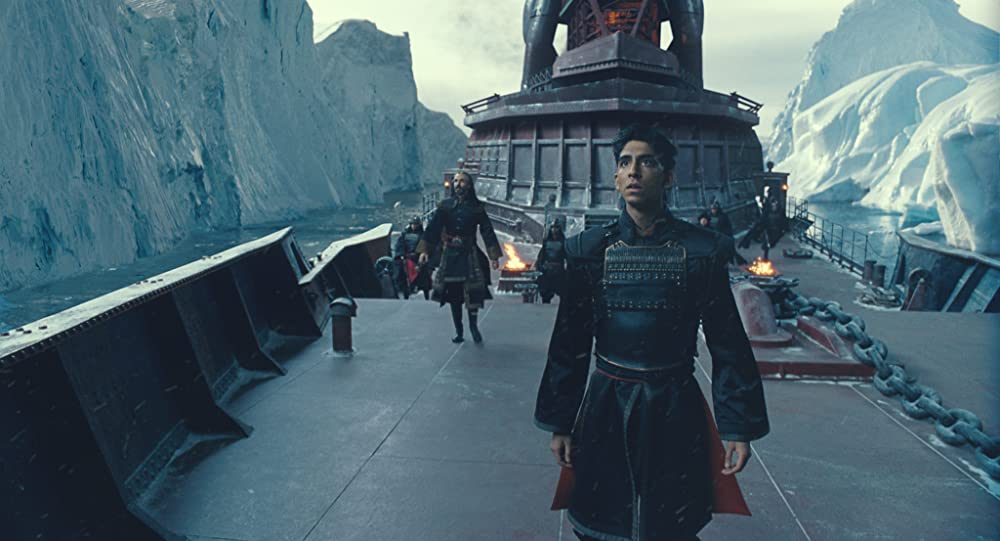
Speaking of authenticity to the show, that’s one of the biggest criticisms The Last Airbender gets. It’s lambasted for how it sucks out all the life, fun, charm, and character out of the series, turning it into a lifeless husk. And I … don’t necessarily disagree. But a lot of that has to do with the execution of its ideas and changes. The acting, some dialogue, and progression from scene to scene, emotional beat to emotional beat, are what drain the story of so much of its heart. But in terms of the aesthetics, the arcs, and the themes behind the story at a conceptual level, I don’t really have any problems.
I have a very radical stance when it comes to adaptations: they don’t need to be faithful to their source materials to be good. At all. Outside of something like the terrible ethnicity swapping, I believe adaptations can make as many changes as they want and go as far from the core of the original story as they please. What matters to me is the artistic integrity and quality of the product as its own thing. You could ask, “Why even bother making an adaptation instead of something original, then?” Well, look at the climate of film right now. With nostalgia and franchises dominating the landscape, I say go ahead and cheat all you want to get a somewhat original story out there. For God’s sake, just give me something different.
So, I don’t care that Sokka in The Last Airbender isn’t the wise-cracking, goofy comic relief he is in the show. I don’t care that a ton of storylines and subplots are taken out or merged with others. I don’t care that there isn’t as much comedy. In fact, one of my biggest issues with the show is that the eccentric, anime-inspired humor is sometimes grating to me. And while I’m fine with prominent humor in a story like this, I’d be lying if I said I wouldn’t prefer it be told in a more serious way like The Last Airbender does. Not that the movie is devoid of humor resembling the show, but it’s very toned down, which I like. And I really, really don’t care that the characters’ names are pronounced differently than in the show. Is it a weird, pointless choice? Yeah. Does it affect the quality of the film in any way at all? Clearly not.
Again, the execution of this different vision is what matters. And … yes, The Last Airbender largely fails there. Sokka, isn’t that interesting here, nor are most of the characters. What little humor there is usually has the same awkwardness as the rest of the acting and dialogue, and the clever ways of condensing a television season are foiled by the rushed, crowded delivery. But that doesn’t mean The Last Airbender shouldn’t have attempted any of these changes. None of my problems with the film are the result of the film’s lack of faithfulness. If the series never existed and this was a completely original movie, all of my criticisms would still apply.
WHY THE LAST AIRBENDER IS GENERALLY FAITHFUL
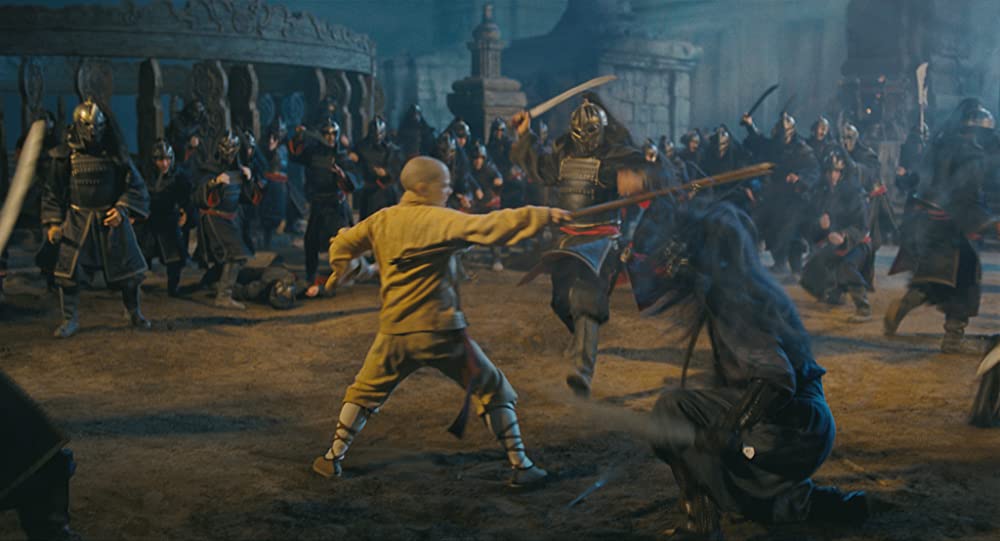
Plus, The Last Airbender is considerably more faithful than what many may have you believe. If anything, it squeezes in way too much of the original series. All of the show’s important developments are here and often play out almost beat-for-beat the exact same way. Aang is still a kid who’s afraid of his responsibilities and grasping the weight of his century-long absence. Zuko is still a disgruntled, banished prince who just wants his honor back. Iroh is still a kind person just trying to help his nephew, and who you can tell has lost a lot of patriotism for his homeland’s war. Zhao still uses his decorated dignity to conceal his increasingly crazed lust for power and glory.
All of the concepts that made the original show so rich, though squandered, are still here. If someone who never saw the show were to watch this movie, they’d still recognize the seeds of greatness in this story, even while admitting that they’re unable to bloom. And as someone who watched the show constantly growing up, I can point out many little touches and details that didn’t necessarily need to be included for this adaptation to function. But they were put in anyway, which makes me believe Shyamalan really is a fan of the show who wanted to capture as much of it as he could.
I also, dare I say it, think Aang’s conclusion in The Last Airbender is better than his conclusion in the show’s Season 1 finale. In the series, he fights a conflict solely by wielding exceptional power and tearing his foes up. Here, he not only uses a different method to win the day, but a psychological component is added that ties off his arc in the film pretty effectively. I also like how The Last Airbender cuts the whole hurdle of the North Pole waterbending master (Francis Guinan) initially refusing to teach women. It was pointless in the show and I don’t miss it here.
Then there are smaller new additions to the story that I just personally like, like Zuko’s test to see whether Aang is the Avatar, the idea of most firebenders needing fire to fight instead of producing it from their hands. I also like the motif of Aang learning to bow to those who want him to be the Avatar, and his talks with a dragon spirit work in the spiritual aspect of being the Avatar nicely enough. I’ve also gone way too long without mentioning James Newton Howard’s incredible score. It’s sweeping, epic, memorable, has several fantastic running themes, and quite frankly carries a majority of this film alongside the production design.
WHY I APPRECIATE THE LAST AIRBENDER
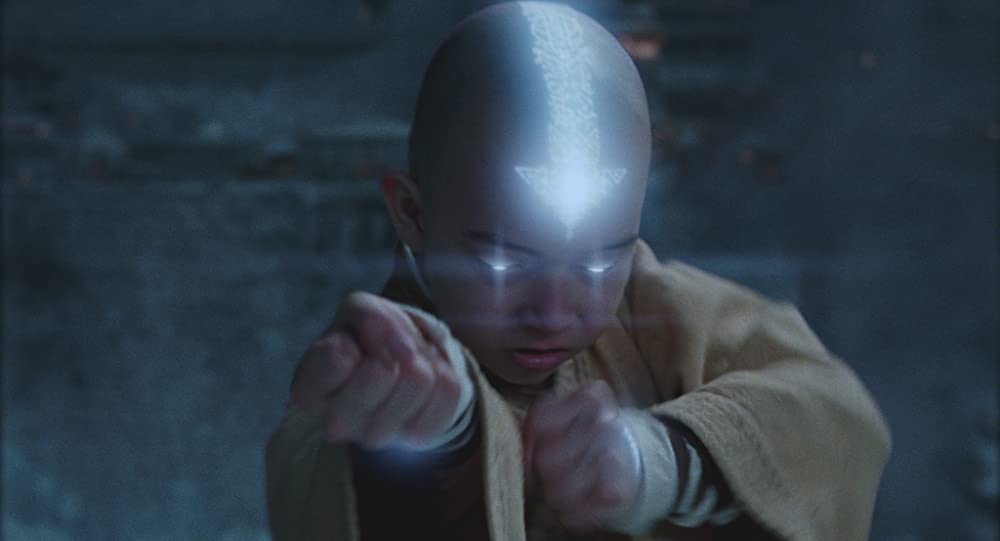
Whether you demand faithfulness in your adaptations or are like me and don’t care about that, The Last Airbender is a bad film. It’s paced horrendously, the acting is often wooden, the action is underwhelming, the dialogue can be way too stiff and expository, and the changed ethnicities are … well, just plain wrong. I’m not going to deny any of that for a second. But I don’t think this is an absolutely terrible catastrophe of a film or even a disrespectful adaptation. Shyamalan just didn’t know how to make his vision work, even if that vision was mostly fine in my book.
That’s why, despite its overall lackluster quality, I find myself enjoying The Last Airbender purely as a guilty pleasure now. I see and appreciate what it’s trying to do with a property that I’ve held close to me, and I can selfishly enjoy watching moments I know so well being reenacted in live-action, even if I know they’re being done poorly. But even with that said, the sets, music, and even a few performances are legitimately really good, and I admire the effort that went into them. To a point where, had a sequel been greenlit, I’d want a lot of the crew who worked on this movie to return under a different director.
I’ve also just come to develop a soft spot for Shyamalan after years of catching up on his movies and watching his newer ones. He puts his all into everything he does, and he’s made films ranging from genuinely fantastic to fascinatingly terrible as a result. I truly believe that he really wanted to make a film that would satisfy both fans and newcomers. Clearly it didn’t work, and I considered The Last Airbender to be worthless like everyone else for a long time. But now that I’m older and have examined it as closely as I have, I can find something of worth buried beneath its many, many failures.
The Last Airbender is now available to watch on digital and on demand. Read our reviews of M.Night Shyamalan’s Trap, Knock at the Cabin, Old, The Sixth Sense, Signs, Split, Glass, The Visit, and The Last Airbender.

